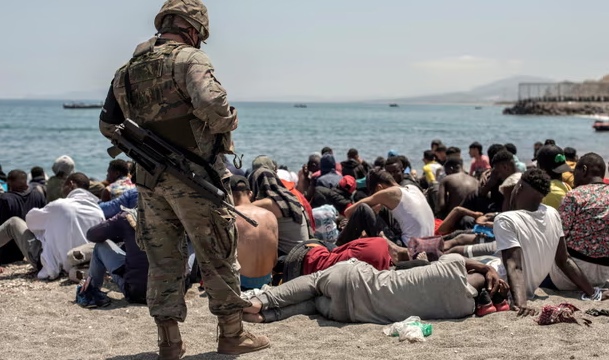As migrant numbers soar, the office of Spanish Prime Minister Pedro Sánchez said on Wednesday he would embark on a three-day visit to Mauritania, Gambia and Senegal, from whose shores boats carrying migrants heading for the Spanish archipelago are departing, Brussels Signal reports.
According to Fernando Clavijo, governor of the Canary Islands, tens of thousands of people have already reached Spain, while around 300,000 more sub-Saharan Africans are currently waiting in Mauritania for better sea conditions to try to cross to the Canary Islands.
According to Spanish Interior Ministry figures for the period 1-15 August, migration was up 143 per cent in the Spanish autonomous cities of Ceuta and Melilla on the North African coast compared to last year, and 126 per cent higher in the Canary Islands. Local journalist Ximena Borrazás told Brussels Signal:
“Here in the Canary Islands, the situation is tense. So far this year, 11,000 people have already arrived. In less than 24 hours, 295 people arrived on Hierro [in the Canaries], a very small island that does not have the resources to accommodate so many.”
Fernando Clavijo, governor of the Canary Islands, had earlier criticised Sánchez for not taking the time to discuss the refugee influx with him, noting that the prime minister was on holiday in the islands. Clavijo told reporters on August 19:
“Come on, I find it hard to understand he would go on holiday to Lanzarote and we could not have that half hour or that hour to deal with these matters. But it is not up to me, I am available.”
However, on August 20, Sánchez said he would meet with Clavijo on August 23, when he plans to visit La Palma.
Clavijo said Sánchez should amend the migrant law to allow the movement of unaccompanied migrants from the Canary Islands to other regions of Spain. He added that there are currently around 5,700 unaccompanied minors living on the islands and there is already not enough space to accommodate them, with a new surge of arrivals expected in the coming months.
In May, a juvenile centre on Lanzarote failed an official inspection due to reports of an ant and cockroach infestation. If Sánchez was hoping for more encouraging news from Mauritania’s leadership about the 300,000 migrants waiting to be sent to Spain, he was likely disappointed. Borrazás said the prime minister “is likely to invest money to try to stem the flow of migrants.”
Mauritania was the main source of wooden boats arriving in the Canary Islands at the end of 2023, a trend that analysts believe will increase over the next few months as the sea water calms down.
According to official figures, seven out of 10 irregular migrants entering Spain do so via the Canary Islands, with 50 per cent sailing off the coast of Mauritania. In its report, the Spanish Guardia Civil also predicted that there would soon be a “significant upsurge” in illegal migration to the Canary Islands.
Huge groups of migrants are constantly trying to cross both the southern and island borders of Spain. In recent years, the Canary route has solidified its status as the world’s deadliest route.
